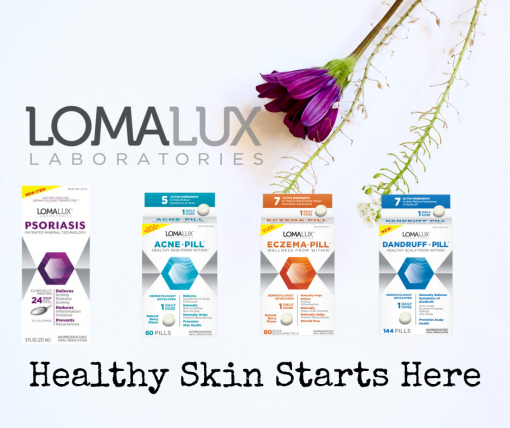How Inflammation Impacts Acne, Dandruff, Eczema, Psoriasis & Rosacea – And How You Can Help Manage It
| 24Jan2019
Your Skin Is Designed To Protect You
Your skin protects you from heat, light, injury, and infection, preventing bacteria, viruses and other foreign substances from entering your body. When altered or injured, your skin sends signals to repair the breach by releasing inflammatory chemicals. Skin inflammation is the body’s healing response, without it, we can’t heal.
Acute Inflammation – The Body Heals Itself
Acute inflammation is a one-time event, such as getting sunburn from spending too much time in the sun without proper sun protection. Acute inflammation usually heals itself once the offending pathogen is eliminated; your skin is equipped to repair inflammation on its own.

The Bad Guy – Chronic Inflammation
When the inflammatory response continues, it damages the skin/body instead of healing it. Under assault, these inflammatory messengers trigger an inflammatory response. Some cause redness via vasodilation; some activate nerve cells to trigger the itch response while others trigger inflammatory hormones, enzymes, free radicals and chemicals that damage your skin.
Chronic (long-lasting) inflammation is linked to acne, dandruff, eczema, psoriasis, rosacea, and even visible skin aging. Moreover, many other diseases such as heart disease, diabetes, respiratory conditions like asthma and rheumatoid arthritis also have chronic inflammation in common.
Acne & Rosacea
Inflammation occurs at all stages of acne lesion development. Both acne & psoriasis involve excessively rapid turnover of skin cells lining the hair follicles.
Eczema –
Eczema is an inherited disease that affects both children and adults. Instead of protecting, the skin has a weak outer barrier, creating “holes” that leave it unprotected from foreign invaders and moisture loss resulting in dry, irritated, itchy skin. Many people with eczema also are prone to allergies such as asthma, food allergies, and hay fever.
Psoriasis & Dandruff
In healthy skin, skin cells grow deep within the skin and slowly rise to the skin’s surface, usually every 23 to 30 days. This process speeds up and happens within days. The skin cells rise to the surface of the skin, forming thick, red skin patches with silvery scales.
Chronic Inflammation & Other Chronic Diseases
Inflammation also impacts other diseases. Heart disease, diabetes, asthma, rheumatoid arthritis, and gout also share inflammation as a common element, where inflammation triggers the attack of healthy tissue and organs.
Factors That Cause Chronic Inflammation
While genetics and exposure to toxic environmental contaminants are causes, lifestyle can play a significant role in chronic inflammation. You can’t change your genes, but you can change your lifestyle.
Change Your Lifestyle – Reduce the Inflammatory Response
Fortunately, there are a lot of lifestyle changes you can make that can reduce inflammation. In essence, follow a healthy lifestyle that includes healthy food choices, exercise, weight management, getting enough sleep, and getting regular medical and dental check-ups will all help reduce your body’s inflammatory response.
Natural Antioxidants With Anti-Inflammatory Benefits
There are many naturally derived botanicals that research has identified as having anti-inflammatory benefits. The most potent is curcumin, a constituent of turmeric. Other anti-inflammatory friendly antioxidants are quercetin (in apples), resveratrol (in wine) epigallocatechin gallate (in green tea) and bisabolol (in chamomile).

Make Healthy Food Choices
Healthy food is vital in fighting inflammation because our digestive bacteria release chemicals that either increase or decrease inflammation in our bodies. Some foods are anti-inflammatory while others are inflammatory.
Here’s a partial list of anti-inflammatory foods:
- Fruits & vegetables, especially the brightly colored ones (Turmeric, red grapes, cherries, plums, spinach, kale, collard greens)
- Nuts & Seeds
- Green Tea, Coffee, Cocoa
- Lean Meat
- Olive oil, Fish Oils/Vitamin D3 supplements
Unhealthy foods generally also are inflammatory, such as sodas, refined carbohydrates (white bread, pasta), fatty red meat, processed meats/cheeses and anything with high-fructose corn syrup.
Make Healthy Lifestyle Choices
Exercise regularly – along with maintaining a healthy body weight; exercise has anti-inflammatory benefits as well. It reduces inflammation-promoting macrophages in fat tissue and also prompts muscles to release an anti-inflammatory protein. Exercise also helps relieve chronic stress, which also reduces body inflammation.
Quit Smoking – smokers have high levels of CRP (C-reactive protein), which decrease when you quit.
Try For 7 – 9 Hours of Sleep Nightly. Beyond other health issues, sleep-deprived people have higher blood levels of stress hormones that promote inflammation.
Get Regular Medical & Dental Check-Ups – Your doctor can check you for CR ( c-reactive protein), an inflammation marker that can predict your heart disease risk. Also, be sure to get regular dental check-ups, as periodontal disease can also provoke inflammation that is associated with heart diseases, type 2 diabetes, osteoporosis, and rheumatoid arthritis.
Healthy Skin Starts with the Natural Minerals in Loma Lux Products
Developed by our dermatologist founder, Loma Lux Acne, Eczema, Dandruff and Psoriasis products all contain an exclusive blend of mother-earth derived all natural minerals that are taken as a vitamin to clear skin, inflammation, and itching from the inside out – for healthy skin from within.

